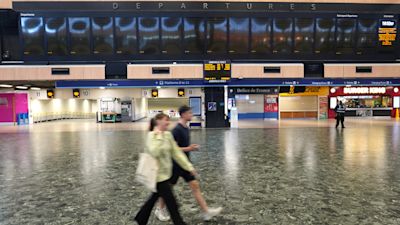Rail strike: Train services to face further disruption as talks resume

The aftermath of Tuesday's rail strike will mean Wednesday is "going to be quite a messy day" for passengers, as talks resume in a bid to resolve a bitter dispute over jobs, pay and conditions.
Chaos will continue on Wednesday, with only 60% of trains running, mainly due to a delay to the start of services as signallers and control room staff are not doing overnight shifts.
Fewer than one in five trains ran on Tuesday in the biggest rail strike for a generation after members of the Rail, Maritime and Transport union (RMT) on Network Rail (NR) and 13 train operators staged the first of three walkouts.
Strikes are set to follow on Thursday and Saturday - with around 40,000 members taking part - with delays and disruption expected in the days after each walkout.
RMT members on the London Underground also staged a walkout on Tuesday, meaning most of the lines are currently suspended or experiencing severe delays.
The joint action caused travel chaos across the UK - roads were rammed with traffic as people switched to cars or buses to get to work, while thousands of drivers queued outside the gates of Glastonbury Festival on Wednesday morning with some waiting all night to get in.
Anthony Smith, the chief executive of Transport Focus, the independent watchdog for transport users, urged travellers "please do not assume that this is a normal day".
“Today is going to be quite a messy day still," he told BBC Radio 4’s Today programme.
“Virtually all of the train companies have special timetables in place, services are starting up late and trains and staff are not in the right place.
“If you are going to travel by train check before you leave the house, check on the way to the station and, for goodness sake, bring a bottle of water with you.”
As the travel disruption continues, the RMT is set to meet with NR and the train companies on Wednesday in another attempt to break the deadlock.
Deputy Prime Minister Dominic Raab said rising inflation figures show the need for pay restraint in the public sector and on the railways.
He told Sky News there is a risk of a “vicious cycle” of rising wages pushing inflation even higher if union demands are met, adding that the government is taking a “firm line”.
He said the strikes were “deeply regrettable” and that reform was needed on the railways to swap out some old practices which are "well out of date and unnecessary".
“I think Network Rail are taking the right approach. We know that the cost of living challenge is there, we know that it affects workers across the board," Mr Raab told LBC Radio.
“But the one thing that will keep inflation higher for longer and undermine pay packets for longer is if we have spiralling public sector pay increases beyond what is responsible. And that’s what’s at issue here."
RMT general secretary Mick Lynch said the turnout at picket lines on Tuesday was “fantastic” and had exceeded expectations in the union’s campaign for job security, defending conditions and a decent pay rise.
Mick Lynch tells ITV News why the strikes are going ahead and what the unions say needs to change
He said: “Our members will continue the campaign and have shown outstanding unity in the pursuit of a settlement to this dispute.
“RMT members are leading the way for all workers in this country who are sick and tired of having their pay and conditions slashed by a mixture of big business profits and Government policy.
“Now is the time to stand up and fight for every single railway worker in this dispute that we will win.”
A Department for Transport spokesperson said: “These are desperately needed reforms that modernise the railway and put it on a sustainable footing for passengers and taxpayers.
“Unions have shut down big parts of the rail network, hitting local businesses and unfairly cutting people off from hospitals, schools and work.
“However, early data shows that unlike in the past many people now have the opportunity to work from home, so we haven’t even a rush to the roads, as traffic has instead gone online, which means the unions aren’t having the overall impact they might have hoped.”
The union has been asked by Network Rail to attend formal consultation talks next month on introducing “modern working practices”.
Network Rail official Tim Shoveller said the changes will mean “dumping outdated working practices and introducing new technology”.
He added: “We expect this will reduce roles by around 1,800, the vast majority of which will be lost through voluntary severance and natural wastage.”
Most adults believe the rail strikes are justified, according to an opinion poll.
A survey of over 2,300 people by Savanta ComRes showed that 58% said the industrial action was justified.
Commuters from around the country react to the strike action:
Younger adults aged 18-34 (72%) and Labour voters (79%) were more likely to see the strikes as justified compared to their older, aged 55+, (44%) and Conservative-voting (38%) counterparts.
Three out of five of those polled poll said they are generally supportive of the principle of industrial action, while just 35% were generally opposed.
Prime Minister Boris Johnson put the public on notice for further strike action as Downing Street said it would “not give in” to demands from the rail unions.
Mr Johnson warned commuters they must be ready to “stay the course” and urged rail bosses and unions to agree on a modernisation package to safeguard the future of the industry.